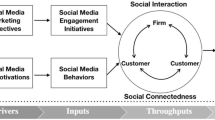Abstract
This article presents three points of consensus about game-theoretic work in marketing: First, equilibrium analysis is necessary for studying situations that have strategic interactions. In many cases, empirical examination of these strategic scenarios is difficult or impossible, at least without the guidance of an equilibrium model. Second, more general models are not necessarily “better,” because institutional details matter. Thus, the appropriate compromise between generality and specificity depends on the scope of the research question. Finally, there should be a two-way road between theory and empirics—theory is necessary to interpret empirical results, while empirical findings should guide theoretical modeling choices.
Similar content being viewed by others
References
Acquisti, A., & Varian, H. R. (2005). Conditioning prices on purchase history. Marketing Science, 24(3), 367–381.
Bass, F. M. (1995). Empirical generalizations and marketing science: a personal view. Marketing Science, 14(3), G6–G19.
Branco, F., & Villas-Boas, J. M. (2010). Competitive vices. Working paper.
Chen, Y., & Riordan, M. H. (2007). Price and variety in the spokes model. The Economic Journal, 117(522 (07)), 897–921.
Chen, Y., & Riordan, M. H. (2010). Preferences, prices and performance in monopoly and duopoly. Working paper.
Coughlan, A. T., Chan Choi, S., Chu, W., Ingene, C. A., Sridhar Moorthy, V., Padmanabhan, J. S., et al. (2010). Marketing modeling reality and the realities of marketing modeling. Marketing Letters, 21, 317–333.
Desai, P., Purohit, D., & Vernik, D. (2011). Music downloads and the flip side of DRM protection. Marketing Science, 30, 1011–1027.
Fudenberg, D., & Villas-Boas, J. M. (2006). Behavior-based price discrimination and customer recognition. In T. J. Hendershott (Ed.), Handbook on economics and information systems (Vol. 1, pp. 377–436). Amsterdam: Elsevier.
Godes, D., & Mayzlin, D. (2010). Using the compensation scheme to signal the ease of a task. Working paper.
Guo, L., & Iyer, G. (2010). Multilateral bargaining and downstream competition. Working paper.
Hart, O. D., & Tirole, J. (1988). Contract renegotiation and coasian dynamics. Review of Economic Studies, 55(4), 509–540.
Meyer, R. J., Vosgerau, J., Singh, V., Urbany, J. E., Zuberman, G., Norton, M. I., et al. (2010). Behavioral research and empirical modeling of marketing channels: implications for both fields and a call for future research. Marketing Letters, 21, 301–315.
Orhun, Y. (2010). Strategic interactions in the presence of heterogeneous beliefs. Working paper.
Pazgal, A., & Soberman, D. (2008). Behavior-based discrimination: is it a winning play and if so when? Marketing Science, 27(6), 977–994.
Pazgal, A., & Soberman, D. (2010). Behavior-based and location-based prices: winning with information. Working paper.
Shaked, A., & Sutton, J. (1982). Relaxing price competition through product differentiation. Review of Economic Studies, 49, 3–13.
Shin, J., & Sudhir, K. (2010). A customer management dilemma: when is it profitable to reward your own customers? Marketing Science, 29, 671–689.
Shin, J., Sudhir K., & Yoon, D.-H. (2012). Customer cost based pricing. Management Science (in press).
Shugan. (2005). Marketing and designing transaction games. Marketing Science, 24(4), 525–530. Fall.
Sun, M., Villas-Boas, M., & Branco, F. (2012). Optimal search for product information. Management Science (in press).
Thomadsen, R., Pagal, A., & Soberman, D. (2012). Location choice and profit-increasing entry. working paper.
Villas-Boas, J. M. (2004). Price cycles in markets with customer recognition. RAND Journal of Economics, 35(3), 486–501.
Zeithammer, R., & Thomadsen, R. (2012). Vertical differentiation in the presence of variety seeking. Management Science (in press)
Author information
Authors and Affiliations
Corresponding author
Rights and permissions
About this article
Cite this article
Thomadsen, R., Zeithammer, R., Iyer, G. et al. A reflection on analytical work in marketing: Three points of consensus. Mark Lett 23, 381–389 (2012). https://doi.org/10.1007/s11002-012-9184-3
Published:
Issue Date:
DOI: https://doi.org/10.1007/s11002-012-9184-3




